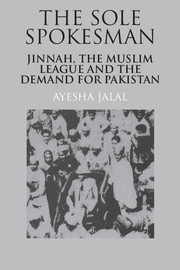Book contents
- Frontmatter
- Contents
- List of maps
- Preface
- Preface to the paperback edition
- List of abbreviations
- 1 Muslims 1931. Data by minor administrative subdivisions and major administrative divisions
- 2 Major administrative divisions
- Introduction
- 1 Jinnah between the wars
- 2 Jinnah and the League's search for survival
- 3 Jinnah and the Muslim-majority provinces
- 4 Centre and province: Simla and the elections of 1945–46
- 5 Jinnah's ‘Pakistan’ and the Cabinet Mission plan
- 6 The interim government: Jinnah in retreat
- 7 The end game: Mountbatten and partition
- Glossary
- Select bibliography
- Index
Preface to the paperback edition
Published online by Cambridge University Press: 01 June 2011
- Frontmatter
- Contents
- List of maps
- Preface
- Preface to the paperback edition
- List of abbreviations
- 1 Muslims 1931. Data by minor administrative subdivisions and major administrative divisions
- 2 Major administrative divisions
- Introduction
- 1 Jinnah between the wars
- 2 Jinnah and the League's search for survival
- 3 Jinnah and the Muslim-majority provinces
- 4 Centre and province: Simla and the elections of 1945–46
- 5 Jinnah's ‘Pakistan’ and the Cabinet Mission plan
- 6 The interim government: Jinnah in retreat
- 7 The end game: Mountbatten and partition
- Glossary
- Select bibliography
- Index
Summary
When it first appeared in 1985, The Sole Spokesman was seen as questioning ruling orthodoxies about historical processes that led to the partition of India. The publication of a new paperback edition eight years later might suggest that the book in the meantime has come to be recognized in scholarly circles as something of a new ‘orthodoxy’ surrounding the central event in the history of twentieth-century South Asia. For someone uncomfortable with orthodoxies of all kinds, this perception is at best a mixed compliment. While it is gratifying to find the main arguments of the book informing scholarly and intellectual debates on South Asia, The Sole Spokesman continues to represent a challenge to the fossilized political thinking sustaining centralized state structures and monolithic ideologies of sovereignty in the subcontinent.
One of the principal aims of the book was to tease out the inwardness of the real political aims of Muhammad Ali Jinnah and the All-India Muslim League in the final decade of the British raj in India. Whatever the merits or demerits of the Muslim claim to nationhood orchestrated after 1940, the lasting relevance of Jinnah's view of the imperative to renegotiate the union of India cannot be denied. Jinnah had held that at the moment of the British withdrawal the unitary centre of the colonial state would stand dissolved. Any new all-India arrangements had to be based on an agreement among the constituent units.
- Type
- Chapter
- Information
- The Sole SpokesmanJinnah, the Muslim League and the Demand for Pakistan, pp. xv - xviiiPublisher: Cambridge University PressPrint publication year: 1985



